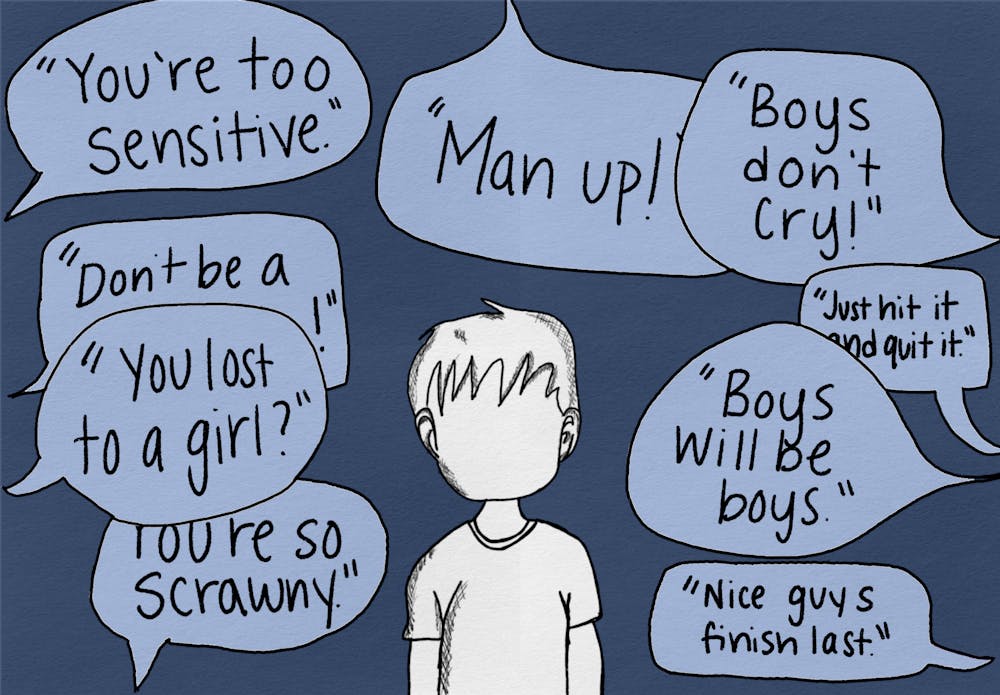Spring enrollment is here — bringing with it the stress and excitement that is planning for the academics of the upcoming semester. While the University’s course offerings are near endless, there is a noticeable lack of classes focusing on healthy masculinity. There is only one class at the University covering the topic, called Men and Masculinities — the course is not even being offered next semester. While I have no doubt this class is helpful, much like how a single class on history would not be able to cover all history adequately, a single 2000-level class on the challenges men face is insufficient. The University should allocate funding to create an additional class on the most dire struggle men face — mental health.
Men today face an epidemic of mental illness and are not equipped to fight it. Nearly one in ten men have some form of depression or anxiety, but fewer than half report it and men are unlikely to seek help for mental health issues. To understand the barriers to seeking help that men face, London University conducted a series of focus groups composed of male students. The results were clear — men feel that seeking help isn’t masculine.
This disconnect between high rates of mental illness and low rates of help-seeking is not innate. It is reflective of a patriarchal society which enforces in men a do-it-yourself attitude. It begins with but goes far beyond the childhood comments of “men don’t cry.” When asked what “masculinity” means to them, a 2019 survey done by GQ Magazine found that over half of respondents viewed “muscular” as masculine, while only 7 percent reported that “vulnerable” had that same connotation.
Facing complex illnesses like depression and anxiety, along with a society which tells them that they are weak for needing help, many men engage in harmful behaviors such as substance abuse. Men are more likely to suffer from alcoholism and die of overdoses. Even more so, with seemingly nothing else to turn to, men are more likely to choose the unthinkable — suicide. If there was a panic button, it would’ve been hit long ago.
Education has continued to prove effective in mitigating the narrow images of gender that contribute to this unfortunate reality — and education is a solution that the University can directly contribute to. In the late 19th century, suffragettes, faced with the tall task of convincing narrow-minded white men of their mental faculty, relied on biology and sociology to dismantle pseudo-scientific arguments which disenfranchised them. The same can be said for early civil rights activists who began the process of dismantling systemic racism by knocking down the “science” which underpinned the system. The pen is just as mighty as the sword. Education may not be a silver bullet, but it has proven capable of beginning cascades of societal change by correcting widely held misconceptions.
There are many shapes a class on men’s mental health could take. Following a class structure similar to Hoos Connected, allowing men to break down barriers in a personal setting would help to give men the tools to process big feelings and tackle challenges that may arise. A more traditional class structure examining the origins of societal stigmas that promote toxic masculinity and showing times when men broke such stigmas in a way that resulted in positive change would help to normalize men seeking help.
We would not be the first to utilize education to address issues facing men. Stony Brook University began offering a master’s program in “masculinities studies” in 2017. The idea of a degree dedicated to men and masculinity may conjure up images of problematic men’s rights activists — but this could not be further from the truth. Much of the work done in these classes attempts to undo a lot of the harm caused by viewpoints that male misogynists commonly push. The program offers an entire course on toxic masculinity, an issue that affects everyone regardless of gender identity. While an entire program might not be feasible at the University, especially with the current lack of funding awarded to gender studies classes, offering a more diverse selection of classes on the subject of healthy masculinity is a great place to start.
Go back and click on the links that detail the rates of alcoholism, suicide and depression among men — the stakes are too high to do nothing. Masculinity is too important an area of study to only have one class at the University about it — not only to help men with their mental health, but also to contribute to deconstructing patriarchal ideologies and practices. Within a liberal arts education, there should not be any limits to what or who we study and where we find connections. Masculinity and men are an area of study that needs its own space so that we can better serve these goals, but even more importantly, so that we can better help others who are all too often overlooked when it comes to vulnerability and care.
Dan Freed is a Senior Associate who writes about Academics for The Cavalier Daily. He can be reached at opinion@cavalierdaily.com.







